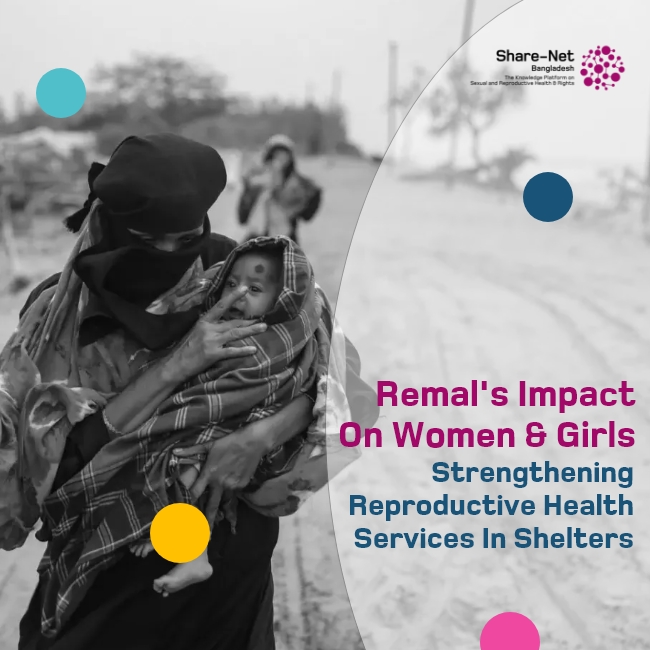Remal’s Impact: Strengthening Reproductive Health Services in Shelters
“Approximately 4.6 million people have been affected by Cyclone Remal, with 61,889 pregnant and lactating women [and birthing people] in urgent need of reproductive health services.” This statement underscores the severe impact of the cyclone, which hit the Sundarbans near the Bangladesh-India border on May 26, 2024, devastating several districts including Khulna, Satkhira, Barguna, Bagerhat, and Patuakhali.
The Gender in Humanitarian Action (GiHA) Working Group swiftly initiated a Rapid Gender Analysis (RGA) on May 27 to assess the cyclone’s differential impacts on women, men, girls, boys, people with disabilities, and gender-diverse groups. The findings highlight critical issues related to Sexual and Reproductive Health and Rights (SRHR) and disaster management, intertwined with the Sustainable Development Goals (SDGs), particularly SDG 3 (Good Health and Well-being), SDG 5 (Gender Equality), and SDG 6 (Clean Water and Sanitation).
SRHR in Crisis: Immediate Needs and Long-Term Goals
Cyclone Remal’s disruption has magnified the need for sexual and reproductive health services in the affected areas. With 61,889 pregnant and lactating women facing severe healthcare challenges, immediate actions are crucial. The RGA recommends establishing ante-natal care services and deploying trained birth attendants to ensure safe deliveries. Additionally, distributing sanitary pads and birth control options is vital to maintaining women’s health and autonomy during this crisis.
Access to healthcare is also hindered by damaged infrastructure and transportation issues. In areas like Bagerhat and Khulna, up to 74% of households reported severe healthcare disruptions. Addressing these gaps is essential for upholding reproductive rights and ensuring that vulnerable populations receive the care they need.
Disaster Management: Ensuring Safety and Security
The cyclone has exacerbated risks of gender-based violence (GBV), with partner violence rates already high in Barishal (44%) and Khulna (57%). To combat this, the RGA calls for the dissemination of information on GBV services, training first responders, and distributing dignity kits to women and gender-diverse groups. Establishing safe spaces for women and girls is also critical to providing a secure environment.
Additionally, the lack of adequate emergency shelters poses significant challenges. Overcrowding and insufficient sanitary facilities in shelters have made them uncomfortable, particularly for women and girls. The RGA recommends improving shelter conditions by providing better lighting, gender segregation, and additional latrines.
WASH Facilities: A Critical Component of Recovery
Access to clean water and sanitation has been severely compromised, with 20,260 water points and 134,269 latrines damaged. The immediate repair of latrines and rehabilitation of tube wells are necessary to restore basic hygiene. Long-term solutions include desalinizing ponds, installing solar-powered pumps, and rebuilding sanitary latrines above flood levels.
The cyclone’s impact on water, sanitation, and hygiene (WASH) facilities directly affects women’s health and dignity, highlighting the need for gender-sensitive disaster management strategies. Ensuring access to clean water and sanitation aligns with SDG 6 and is essential for the well-being of affected communities.
Empowering Women-Led Organizations
Women-led organizations (WLOs) and Women’s Rights Organizations (WROs) play a pivotal role in the response and recovery efforts. Engaging these organizations ensures that the most marginalized and poorest groups receive adequate support. Financial backing for WLOs and WROs can enhance their capacity to reach and aid vulnerable populations effectively.
In conclusion, the Rapid Gender Analysis by the GiHA Working Group underscores the urgent need for a gender-responsive approach to disaster management. By addressing SRHR needs, ensuring safety and security, and improving WASH facilities, the response to Cyclone Remal can be aligned with SDGs, promoting health, gender equality, and sustainable development in Bangladesh.
CLICK HERE TO DOWNLOAD FULL REPORT
Source: ReliefWeb International
